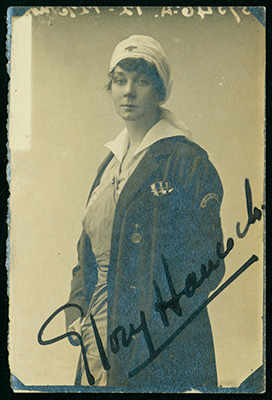Originally published in "North Carolina Nursing History." Republished with permission. For personal educational use and not for further distribution. Please submit permission requests for other uses directly to the NC Nursing History website creators.
30 Aug. 1881-29 Sept. 1930
Madelon "Glory" Hancock: The most decorated nurse in WWI

Born in Pennsacola, Florida in 1881, Madelon "Glory" Battle Hancock grew up in Asheville. Her father, Dr. S. Westray Battle, was a well-known and highly regarded physician known primarily for his work with tuberculosis. After graduating from the Presbyterian Hospital School fo Nursing in New York City in 1905, she married Mortimer Hancock, a British Army officer. When World War One broke out in 1914, Madelon joined the first British Hospital Unit going to the frontline of battle.
In the British Army she was known as "Glory Hancock," for her enthusiastic support of the Allied cause. She went to Antwerp, in Belgium, on Aug. 13, 1914, only a few days after the war began, with the first British Hospital Unit to serve in the war. She remained in that city until Oct. 12 of that year, when during a retreat by the Allies she brought in many wounded Belgians and British, the latter of the Royal Navy Division. She was then attached to the hospital established at Fermes, in Belgium, and nursed there through the first battle of the Yser, when the hospital was shelled by the Germans and had to be excavated. The patients were removed to Heogstadt, where she was during the first and second of Ypres and the second battle of the Marne.
She was at that and other dressing stations close behind the Allies' battle lines until the last moment of the war. She was never beyond the sounds of the guns and frequently within the zone of fire. She was gassed and was repeatedly in the midst of shrapnel fire, but she always escaped without serious injury.
For her services to the wounded and sick and her conspicuous bravery under fire upon various occasions, she received 12 decorations: five from Great Britain, five from Belgium and two from France.
After the War, Hancock returned to North Carolina to visit family members across the state. She died on September 30, 1930 in Nice, France. She had been divorced for several years at the time.